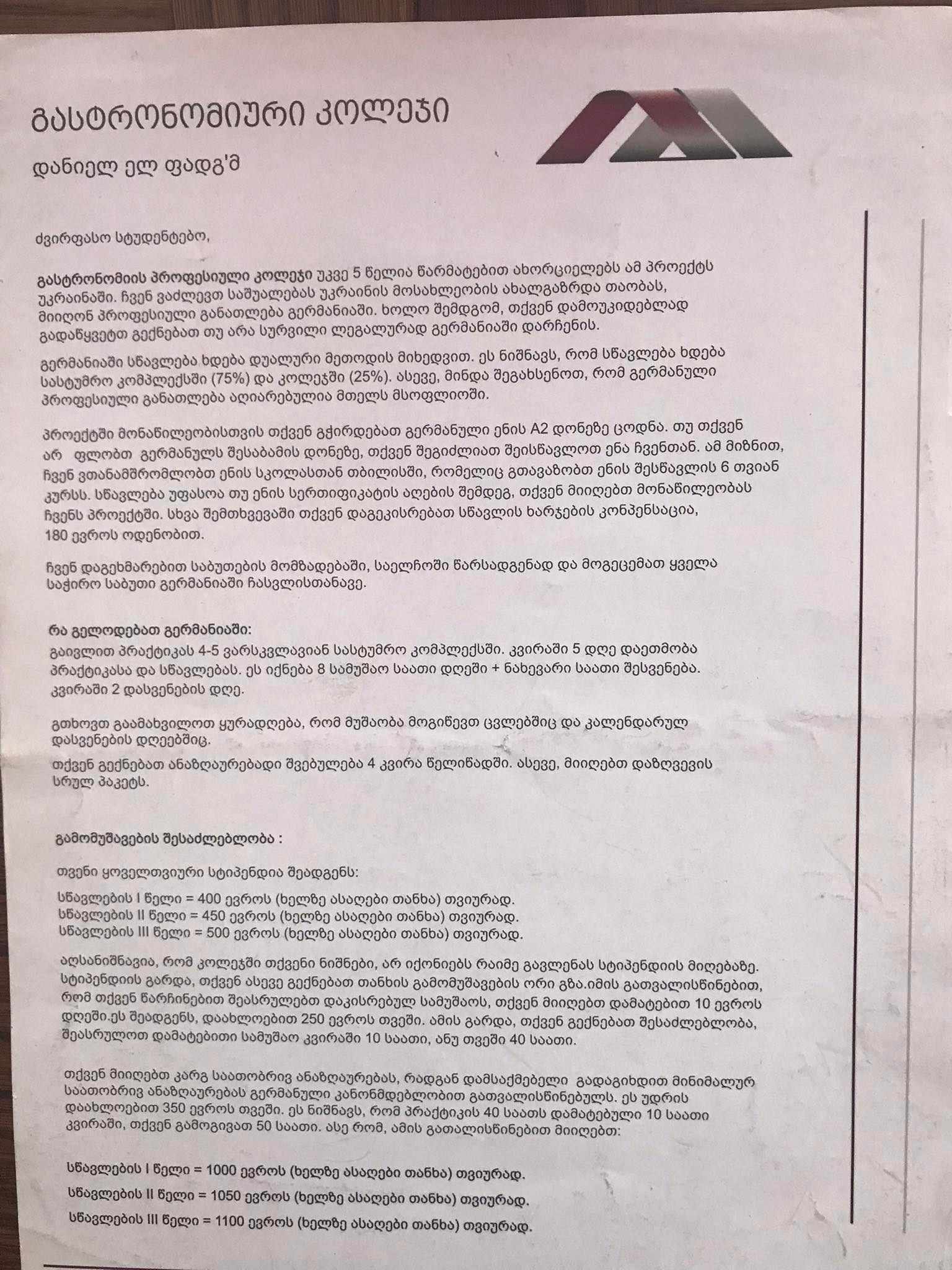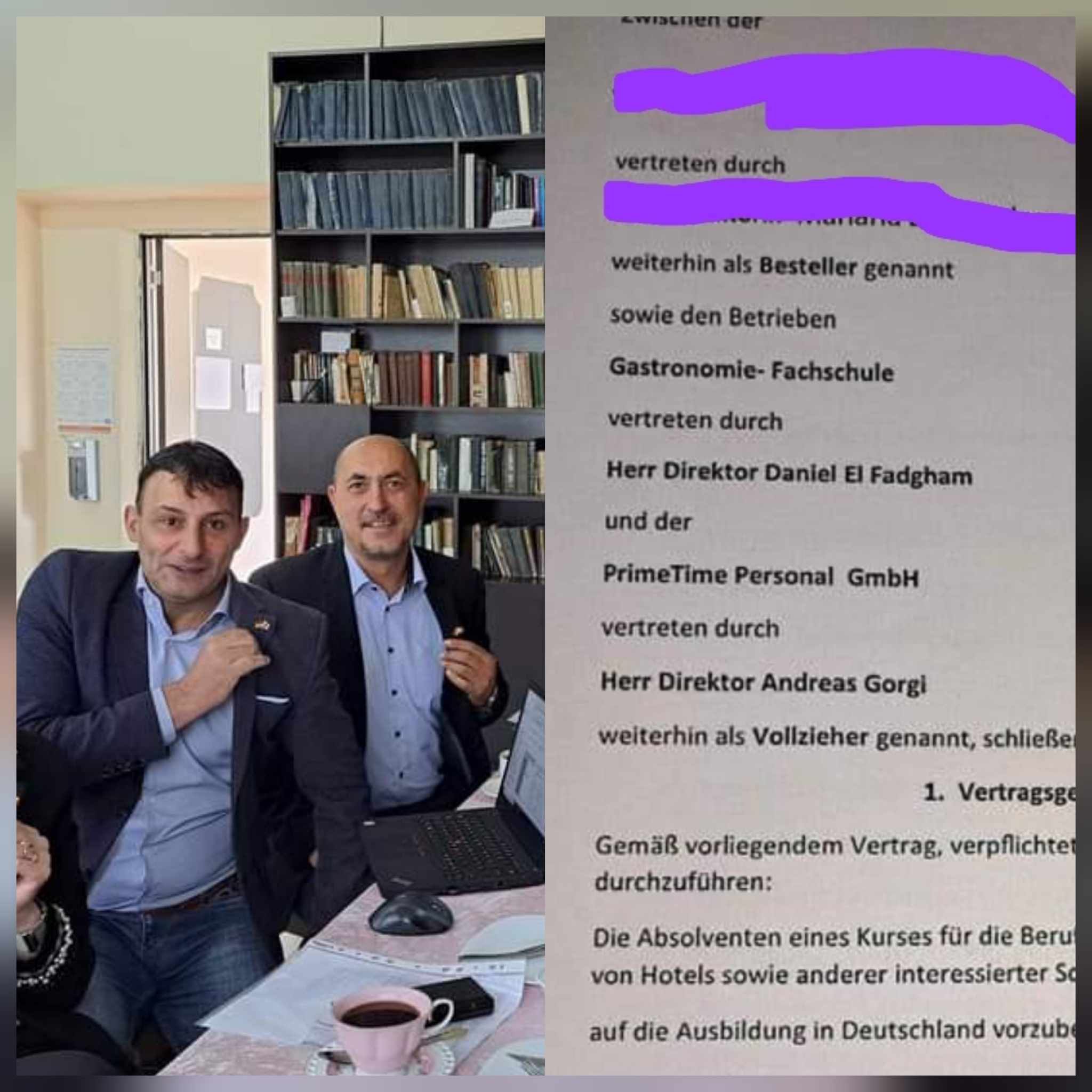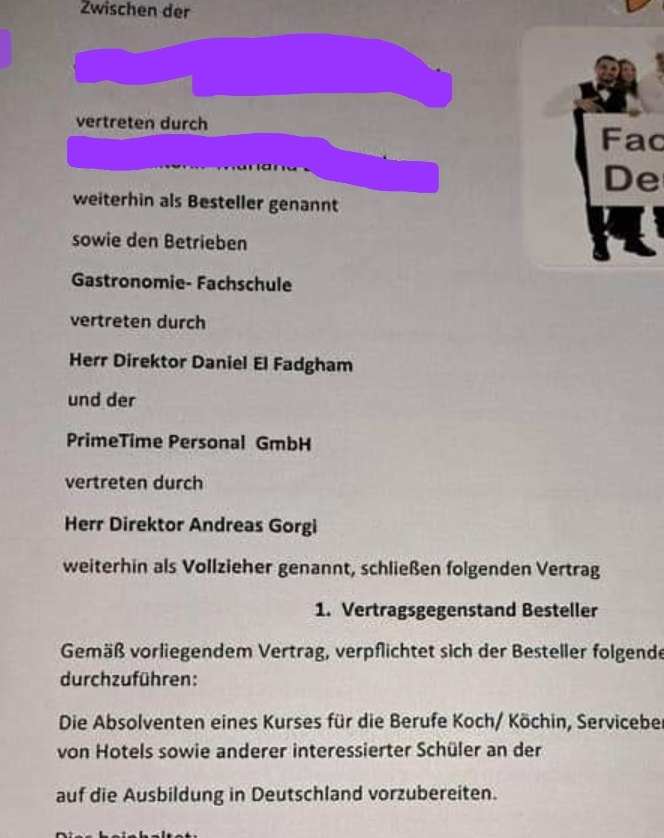Unemployment-related emigration has become one of the most acute problems in the Georgian reality. Based on the latest statistics, more than a quarter of the country’s population works abroad, while every 5th person plans to leave as soon as possible. The unfortunate reality is that due to inappropriate working conditions and low salaries, many talented, educated young people are forced to leave their homeland and work in totally different fields from their professions.
Their hard work abroad also might not be reimbursed properly, however, at least, they’re hopeful and try to achieve better living conditions there, far from their families and loved ones, which can be very stressful.
Georgian blogger, historian, teacher, and humanitarian Giorgi Chubinidze recalls his experience with the German program Ausbildung and some of its “agents.”
As interest in this program in Georgia is quite high and more and more people are seeking to get involved in it, he considered it necessary to share his experience with fellow citizens, to warn them about the possible disappointment following high expectations of “happy and carefree“ future.
In Germany, Ausbildung refers to a vocational training program designed to prepare individuals for specific careers. Ausbildung program is available to German and non-German students, typically lasting between two to three and a half years; it combines both theoretical and practical learning, promising future employment to its students.
However, as it seems, harsh reality is often different from high hopes.
Giorgi, who studied and worked in Germany for a year as part of the Ausbildung program and just returned to Georgia, recalls:
“I promised to many people before and now I want to share with you everything that happened to me and my acquaintances-friends at the beginning of Ausbildung. I really hope this information will be another step in the information vacuum that surrounds these and other programs.
After all, all agents promise you a happy German life… Me and some of my friends have already left the Ausbildung after a year, of our own accord, and now I’m boldly sharing with you all the vicissitudes that we encountered along the way at the beginning of this journey.
We found an Ausbildung “agent” in the Facebook groups, who sent us a description of the “Gastronomical College Daniel El Fadg’m” in the chat. At first, it seemed the strangest thing to me that a gastronomic college with a similar name was nowhere to be found. However, his reply was that “I have had a bad experience with sharing the website and contact details”. Due to a certain trust factor, neither I nor the other 50 Georgians participating in this program, whom they have already taken or are taking from Georgia every year, did not investigate this case.

In short, it finally happened that we made the documents, and the agency settled the necessary documents with the employer, but another important fact here – people who thought they were going to study the hotel business, found themselves in the restaurant business program without any agreement.
Their response was that that were vacancies here at that point, and if possible, they would later change them (later on, many problems arose regarding the issue of shifting, there was a certain limit, and not everyone could do it).
The German agent arrived in Georgia with our documents and the future students and the Georgian-German agents met each other. This agent’s name was Daniel El Fadg’m, whose name had previously been written on the college’s letterhead as the name of the college.

In short, the story got tangled up, but in the end we didn’t have much time to investigate. In a few weeks, we left for Berlin, Germany and started working in a hotel. Meanwhile, one strange fact turned out. As we found out in Germany, we had to pay a service fee of 400 euros to the German agents. This information came as a surprise to many Georgians, as they had already paid the Georgian agent for his services. However, as it turned out later, the German agents did not know that the Georgian agent was being paid separately (because they already paid him a certain amount). Later it turned out that our employer didn’t know this either, and the employer didn’t even know the Georgian agent at all (who he had mentioned several times in the conversation with us, as if he had direct communication with our employer’s hotel).
Another part of the problems has started in Berlin. The main thing we discovered was that these agents do not have any gastronomic college (at least they don’t actually have anything, I still don’t know what they have registered), nor do they work in any other college or educational institution. They have the so-called Helpers bureau “Prime Time”, which provides hotels and restaurants with support staff (which is so much needed in Germany. Germans don’t work in these positions (!). 40 hours per week stipulated by the contract in a huge hotel with 1125 rooms sometimes turned into 50 hours of work.

This is in the case of our flow, but according to the information available to me today, many Georgians, who were sent, work even more in other restaurants, bars, or other institutions, and the additional pay is 0 euros! Because of this, I, personally, and my friends expressed protest many times, while in response, we received a number of insulting letters from this individual – Daniel El Fadg’m – “A person like you disgusts me. What do you think, if you have graduated from university and have a diploma, it makes you smart and intelligent? You know what, get lost from here”. I have the whole set of screenshots of this dialogue, in case anyone has any doubts.
Naturally, I didn’t tolerate it and informed the hotel management. The hotel management expressed “concern,” but did not take any other real action. They still cooperate with this organization and people. The hotel responded so cynically to our complaint about why we work extra hours when it is not written in the contract – “Welcome to gastronomy.” This was when we served banquets of 5000-6000 people for minimum wage in Germany and were asked to work extra hours. As I hear from other Georgians who have recently been taken to Germany, the situation is even more difficult in other hotels and restaurants, and instead of 8 hours, they work for 12 hours or more, and some of them cannot protest, because the probationary period at the beginning of Ausbildung is 4 months, while after this period, the situation still doesn’t change for good – they still threaten to expel them. The problem remains a problem.”
Giorgi also calls on the Georgian youth to be careful, investigate each detail thoroughly and learn the language as well as possible to cope with the difficulties and unexpected, unpleasant “surprises” caused by agents and employees.
“Neither Georgian nor German agents have any response to these issues and problems because according to the rule they are obliged to be “mediators” and defenders of our rights for 3 years). They are silent because Georgians sent to Germany are their source of black and white income, and of course, they don’t want to mess things with companies, restaurants, or hotels.
Here is another interesting story. The hero of our story, Daniel El Fadg’m, and the Georgian agent sign memorandums with public schools and take the Georgians to Germany after graduation.
One of the “happy” schools posted a photo of the memorandum on Facebook, and from there I realized that these schools are also being lied to, because the text of the memorandum reads, “Director of the Gastronomic School, Daniel El Fadg’m” – which school’s director? There is no similar school, therefore neither the administration nor the director.
The name of the second German co-agent is Andreas Gorg. If someone offers you cooperation with them, you should remember this story and at least ask for advice on how to communicate with them, which is even more difficult for inexperienced Georgian youth.
So be careful, friends! Always ask about each detail thoroughly and know where and how you are going, with whom, and with what type of people you have to organize this work.
A question is often asked here – at what level do I need to know German to start Ausbildung? The answer is the only one – as well as possible to protect yourself in the terrible working climate that reigns in these hotels and restaurants! Because the student in their understanding is almost not a perfect person. Therefore, learn the language well. Try Au Pair or social programs and then Ausbildung.
I will also add my blog here – what is Ausbildung in Germany?
good luck!,” – writes the former participant of the Ausbildung program, who, despite the quality education and experience acquired over time, was still forced to temporarily leave his homeland and work abroad, looking for better pay and work conditions in general. And sadly, he’s neither the first nor the last!














